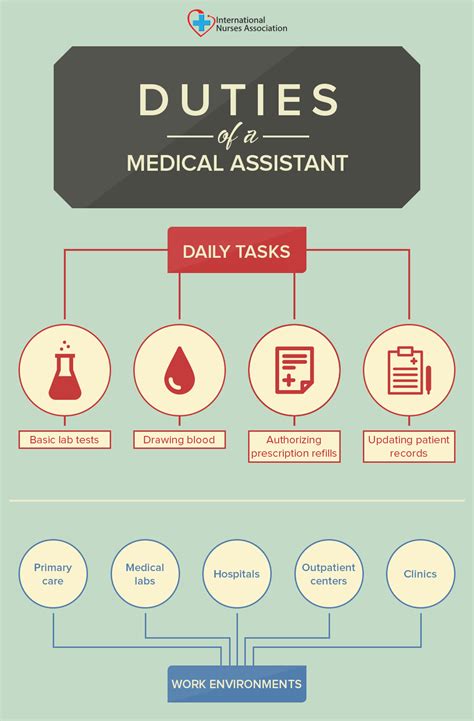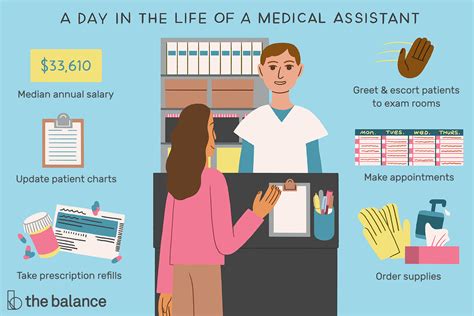Intro
Discover the vital role of Medical Assistants in healthcare. Learn the 7 key job duties, including patient care, administrative tasks, and medical procedures. Understand the responsibilities, skills, and qualifications required to excel in this in-demand profession and explore the various specializations, such as clinical and administrative assistants.
As the healthcare industry continues to grow and evolve, the role of medical assistants has become increasingly important. Medical assistants are the backbone of any healthcare facility, providing essential support to medical professionals and ensuring the smooth operation of day-to-day activities. If you're considering a career as a medical assistant, you're probably wondering what kind of job duties you'll be responsible for. Here's an overview of the key job duties of a medical assistant.
Medical assistants play a vital role in the healthcare system, and their duties can vary depending on the specific work setting. Some medical assistants work in hospitals, while others work in clinics, private practices, or even nursing homes. Regardless of the work setting, medical assistants are responsible for a wide range of tasks that help to ensure the delivery of high-quality patient care.

Key Job Duties of a Medical Assistant
1. Administrative Tasks
One of the primary job duties of a medical assistant is to perform administrative tasks. This can include answering phone calls, responding to emails, and greeting patients when they arrive at the office. Medical assistants are also responsible for updating patient records, managing schedules, and handling billing and insurance claims.
- Answering phone calls and responding to emails
- Greeting patients and updating patient records
- Managing schedules and handling billing and insurance claims
2. Clinical Tasks
In addition to administrative tasks, medical assistants are also responsible for performing clinical tasks. This can include taking vital signs, preparing patients for exams, and assisting healthcare professionals with procedures.
- Taking vital signs and preparing patients for exams
- Assisting healthcare professionals with procedures
- Collecting and processing lab samples

3. Patient Education
Medical assistants are also responsible for educating patients on various health topics. This can include explaining medications, providing instructions on wound care, and discussing healthy lifestyle choices.
- Explaining medications and providing instructions on wound care
- Discussing healthy lifestyle choices and promoting disease prevention
- Educating patients on various health topics
4. Medical Records Management
Medical assistants play a critical role in managing medical records. This can include updating patient records, managing electronic health records (EHRs), and ensuring compliance with HIPAA regulations.
- Updating patient records and managing EHRs
- Ensuring compliance with HIPAA regulations
- Maintaining accurate and up-to-date medical records

5. Laboratory Testing
Medical assistants may also be responsible for performing laboratory testing, such as collecting blood samples and preparing specimens for testing.
- Collecting blood samples and preparing specimens for testing
- Performing basic laboratory tests, such as urinalysis and strep tests
- Maintaining laboratory equipment and supplies
6. Medical Billing and Coding
Medical assistants may also be responsible for medical billing and coding, including assigning CPT codes and ICD-10 codes.
- Assigning CPT codes and ICD-10 codes
- Preparing and submitting claims to insurance companies
- Managing billing and coding software

7. Continuing Education
Finally, medical assistants are responsible for staying up-to-date on the latest medical knowledge and technologies. This can include attending workshops and conferences, reading industry publications, and participating in online training programs.
- Attending workshops and conferences
- Reading industry publications and participating in online training programs
- Staying current on the latest medical knowledge and technologies
In conclusion, medical assistants play a vital role in the healthcare system, and their job duties can vary depending on the specific work setting. By understanding the key job duties of a medical assistant, you can better prepare yourself for a career in this field.

We hope this article has provided you with a comprehensive overview of the key job duties of a medical assistant. If you have any questions or would like to learn more about this topic, please don't hesitate to comment below.
What is the primary role of a medical assistant?
+The primary role of a medical assistant is to provide administrative and clinical support to healthcare professionals.
What kind of education and training do medical assistants need?
+Medical assistants typically need a post-secondary certificate or diploma in medical assisting, as well as certification through a professional organization.
What kind of work settings do medical assistants work in?
+Medical assistants can work in a variety of settings, including hospitals, clinics, private practices, and nursing homes.
